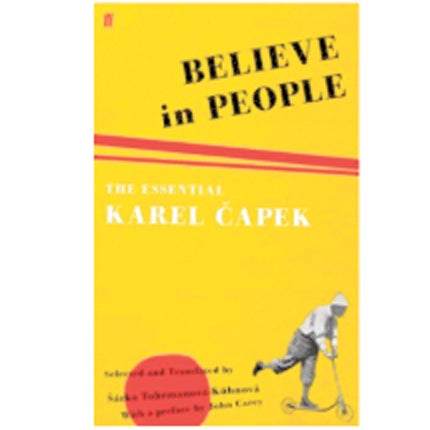Believe in People: The Essential Karel Capek, Translated by Earka Tobrmanova-Kuhnova
Ordinary lives become exceptional

Your support helps us to tell the story
From reproductive rights to climate change to Big Tech, The Independent is on the ground when the story is developing. Whether it's investigating the financials of Elon Musk's pro-Trump PAC or producing our latest documentary, 'The A Word', which shines a light on the American women fighting for reproductive rights, we know how important it is to parse out the facts from the messaging.
At such a critical moment in US history, we need reporters on the ground. Your donation allows us to keep sending journalists to speak to both sides of the story.
The Independent is trusted by Americans across the entire political spectrum. And unlike many other quality news outlets, we choose not to lock Americans out of our reporting and analysis with paywalls. We believe quality journalism should be available to everyone, paid for by those who can afford it.
Your support makes all the difference.A key aspect of the mid-20th century, one might say, was the quarrel between popular and serious culture.
For George Orwell no artefact was too lowly for considered analysis. In a legendary essay of 1939, "Boys' Weeklies", he scrutinised Wizard and Hotspur for evidence of racism. Before Orwell, the Czech writer Karel Capek had applied literary judgement to ephemera in much the same way.
"I am interested in everything that exists," Capek declared, by which he meant subjects from football to barn owls to Charlie Chaplin. Capek is best known for inventing the word "robot" in his 1920 play Rossum's Universal Robots. Much of his work has a science-fiction flavour. His 1936 novel War with the Newts offered a satire on Hitler's drive to acquire living-space in the East. Graham Greene warmly recommended Capek's fantasy: it was reminiscent of early H G Wells, he said, only with "more wit and less horror".
Believe in People, a selection of Capek's newspaper journalism from the 1920s and 1930s, is distinguished by an impish wit and gently subversive tone. The bulk of it has not been translated into English before. For 18 years, Capek wrote for the Prague-based daily The People's Paper, becoming its star contributor. With agreeable courtesy, his journalism made literature and politics accessible to the layman. With a free rein, Capek put his keen mind to the dangers of blind adherence to ideology, as well as the uses and abuses of language.
Capek's literary credo was that the proper study of mankind is man. His articles exude an affecting modesty and polymath's enthusiasm for such everyday matters as gardening, cabbages and soap. With his old-fashioned reverence for work, he eulogises the toil of shoemakers, blacksmiths and woodcutters who work with their hands and take pride in a job well done. "Now I, too, have my craft," he says. In seeking to close the gap between high and low culture, Capek was a writer ahead of his time. He died on Christmas Day 1938, three months before the Nazis invaded Czechoslovakia, having been placed at number three on the Gestapo list.
Ian Thomson's 'The Dead Yard' won the 2010 Ondaatje Prize and the Dolman Travel Book of the Year Award
Join our commenting forum
Join thought-provoking conversations, follow other Independent readers and see their replies
Comments